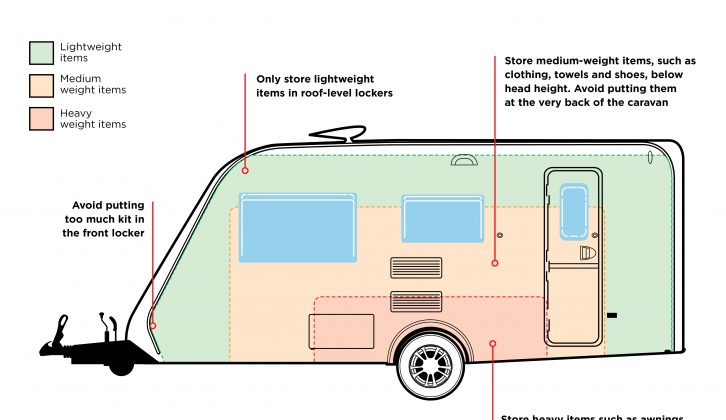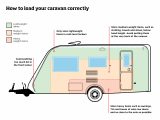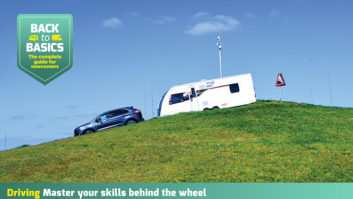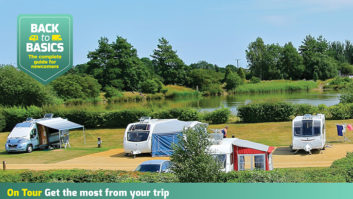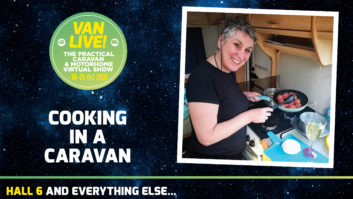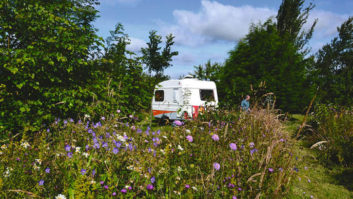The school summer break is here at last, so many of us will be setting off for our family caravan holidays this weekend. Towing to the campsite can be one of the more stressful parts of going away, especially when the roads are busy and the temperatures high. Here’s a simple checklist which should help you prepare your car and caravan for a safe and hassle-free journey.
1. Top up on fluids
Your tow car needs to be in good condition, ready for the journey ahead. Check the oil, coolant and windscreen washer fluid levels, and top them up as necessary. If the windscreen wipers have been smearing rather than clearing the screen of late, replace the blades with new ones to make sure you have a clear view of the road ahead, whatever the weather.
2. Pump up tyres
Cars generally have two sets of recommended pressures for tyre inflation – one for lightly loaded driving and one for travelling with a heavy load. With the whole family on board, a boot full of luggage and the download from the caravan pressing on the towball, it’s important that the tyres are pumped up for heavily loaded driving. The tyres will hold their shape better and the car will be more stable and secure on the road.
Don’t forget the spare wheel, and remember to check the caravan tyres are properly inflated, too, especially if the tourer hasn’t done any touring for a while.
While you’re at it, check the sidewalls for cracks and make sure the tread depth is legal. There should be at least 1.6mm of tread in a continuous band running across the central three-quarters of the tyre around the whole circumference. That applies to the caravan’s tyres as well as the tow car’s.
3. Load carefully
To stay on the right side of the law, you must avoid overloading the car and caravan (the Maximum Authorised Mass is the most the car and caravan can weigh when loaded). If in any doubt, weigh the items you’re going to take with you so you know if you’re going to exceed your car or caravan’s payload.
Safe loading isn’t just a question of how much you carry. Where the weight is and how well it’s secured are also important. It’s better to load the most heavy items in the car so the weight ratio between the car and caravan is favourable. Put heavy things in first so they’re against the back seat and close to the axle, and leave anything you might need while on the journey within easy reach rather than buried under a suitcase.
If you do need to carry anything heavy in the caravan, keep it low down and close to the axle for the sake of stability. Secure the items so they can’t move around while you’re driving. Remember to leave the water tanks empty when travelling. Filling them up is a quick and easy job once you have arrived at the campsite.
Remember the 85% guideline: aim to keep the laden weight of your caravan to no more than 85% of the kerbweight of the tow car, especially if you are new to caravanning. Higher matching ratios of up to 100% are acceptable for experienced tow car drivers. Under no circumstances should the weight of the caravan exceed the car’s legal towing limit.
4. Plan your journey
Few caravanners would ever set off on holiday without knowing where they are going, but it pays to give the last few miles of the route particular attention. Big A-roads and motorways are easy to drive on compared with narrow country roads with steep gradients, rough surfaces and sudden sharp turns.
Many campsites provide advice as to the best way to approach the site when towing, as it’s not always the most direct route. Check the caravan park’s website or give them a call to confirm the easiest way to reach the site, or if there are roads that are best avoided when towing.
5. Check the rules if towing abroad
Touring abroad can be very rewarding, but brings its own challenges. Remember to use adaptors to convert your headlights if you’ll be driving on the right-hand side of the road, and familiarise yourself with the speed limits of the countries you are travelling through.
Regulations differ from country to country, even within the European Union. In France, drivers must have a breathalyser with them (although, oddly, there’s no fine if you are caught without one). Some countries require a driver to have reflective clothing with them in case their car breaks down at night. The AA publishes a useful guide to what’s required in different countries.
Happy holidays!
Safe loading isn't just a question of how much you carry
